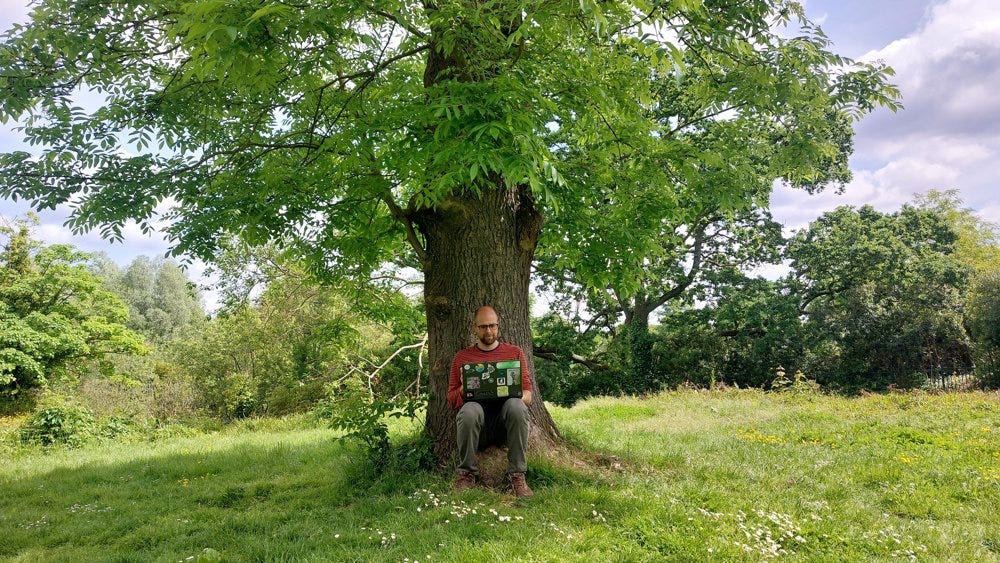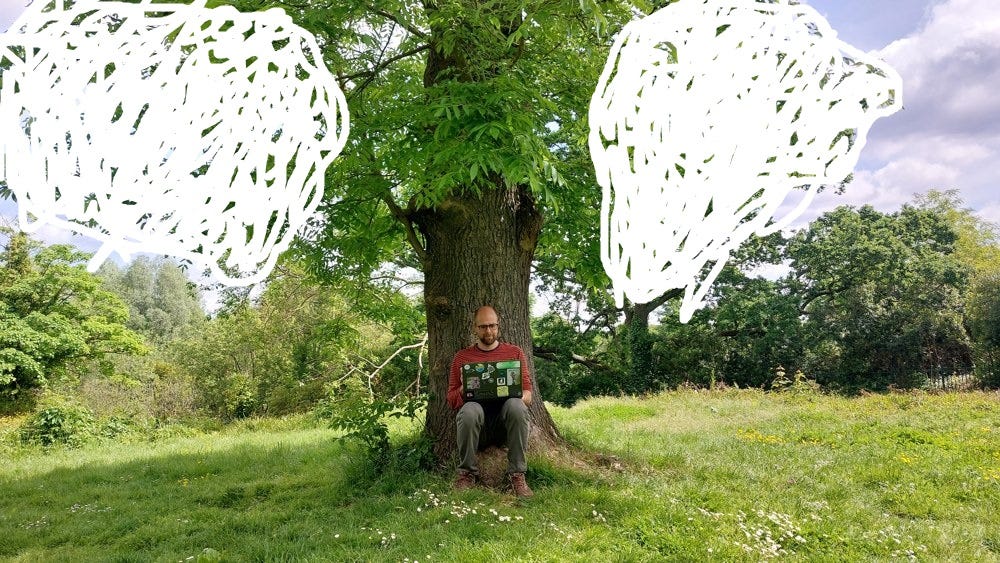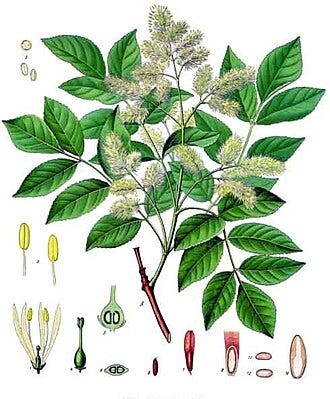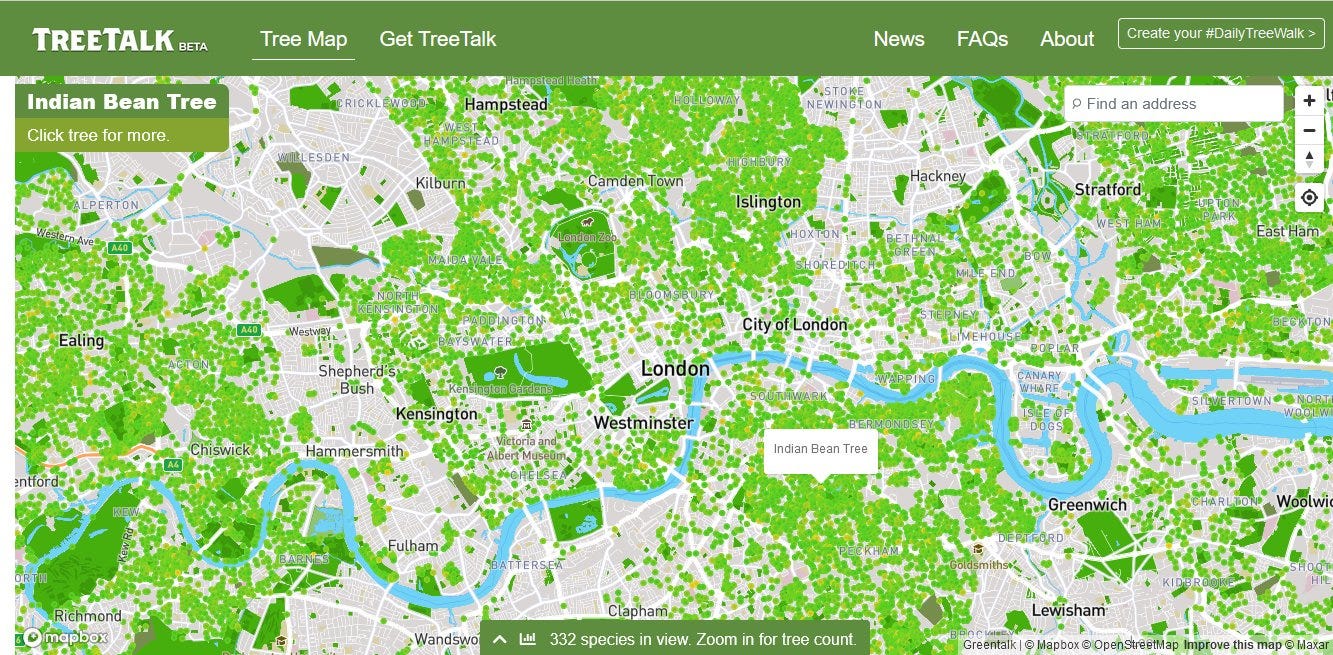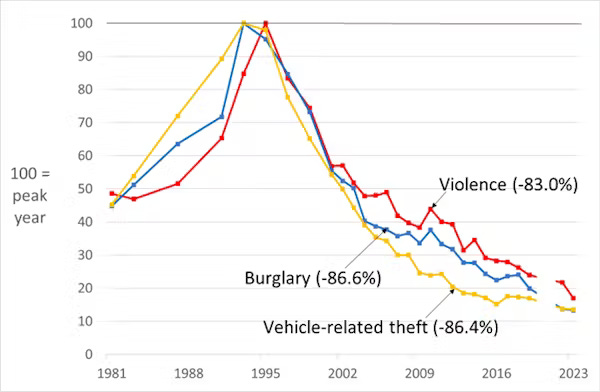Everything I Know About Nature Connectedness: Part 1
Surrounded by a quirrelling of chirrups
Happy Friday!
And warm greetings from the root stool of an ash in Crystal Palace Park, surrounded by a quirrelling of chirrups — parakeets and toddlers.
Despite being Britain’s third most common tree, the ash feels fragile: it’s estimated that, over the coming decades, we will lose 80 percent of our ash trees to a nasty fungal infection.
80 percent.
To give you an idea of what that means, here’s the same bucolic photo above, but with about 80 percent of the ash canopy removed using advanced CGI techniques:
Looks shit, doesn’t it?
(NOTE: It’s not that we’ll lose 80% of ash canopy, but 80% of the actual trees, but that’s harder to emulate with my CGI software.)
It might seem like there’s not an awful lot that you and I can do about ash dieback, but I think one little thing could make a difference: notice and name.
Take a walk. Notice the trees you pass as they shade you from the sun. Name them.
As well as the usual field guides, there are loads of great apps that can help you identify your local trees: British Trees and PictureThis to name two that I use.
Check online as well: your council might have released the dataset of the trees they are responsible for looking after. You never know: someone might even have turned that data into a map for your neighbourhood.
However you name them, name them. Visit them. See how they’re getting on. Listen to what they have to say. And let’s appreciate what we have now. Life is fleeting.
For those of you new around these parts, welcome 👋 My name is David and I’m a writer, outdoor instructor and cyclist-at-large with Thighs of Steel. In this newsletter, I write stories that help you and me understand the world (and ourselves) a little better.
Sometimes I accidentally take a week off — sorry if you missed me last Friday!
Everything I Know About Nature Connection: Part 1
There’s an angling lake in Crystal Palace Park, fenced off to all but members of the Crystal Palace Angling Association, ‘a small friendly club’ whose website is similarly fenced off to all but their initiates.
That’s probably why two men in shorts and shades hopped over the railings to get rod access to the shore of the boating lake further down the hill. Doffing my non-existent cap, I learned that they come here a couple of times a year, catching the occassional scaley flipper, but more often than not ‘just sunbathing’.
According to the Right to Roam campaign, in England we have uncontested right of access to only 8 percent of the land and 3 percent of our rivers.
The campaign doesn’t report on open access to boating and angling lakes, but it’s telling that I have to travel 43 miles from Crystal Palace to find bathing water bigger than a puddle into which I can freely dabble my feet (Frensham Great Pond, since you ask).
This leads me to the first thing that I know about nature connectedness — it’s something I’ve taken for granted all my life, something that every generation takes for granted, as our baseline of nature connection falls with every year that passes —
We need access to nature if we ever want to dream of reconnecting.
Public Service Announcement
You DON’T have to select all squares with motorcycles
Just click random squares and then hit continue. It’s supposed to be a test of your humanity; rebellion feels like a small win against the machine.
(Don’t blame me if you spend The Rest of All Time clicking on squares that are not motorcycles and never get through to your online banking.)
Three Tiny Big Things
1// Patriarchy According To The 👱♀️ Barbie Movie
We’re going to use the movie as a sort of primer to help explain what patriarchy actually is, what it isn’t, and how it ends up harming everyone, including men.
2// A Map of Nearly All The 🌳 Trees In London
Amazing: TreeTalk will tell you all about the trees in your neighbourhoood (in London). It can even design a walk for you that takes in a dozen or so trees of note.
I discovered that my girlfriend’s favourite neighbourhood tree is an extremely rare Salt Cedar, one of only 13 identified in London.
The map was created during the pandemic by a small collective including Paul Wood (what a name!), author of London is a Forest, which I’m currently reading, and co-founder of the Urban Tree Festival, which I’m furious to discover started on Monday. It ends on Sunday — go!
3// Most Crime 📉 Down 90% In UK
… But UK public believes the exact opposite.
The drop in violence includes domestic violence and other violence against women. Anti-social behaviour has similarly declined. While increased fraud and computer misuse now make up half of crime, this mainly reflects how far the rates of other crimes have fallen.
All high-income countries have experienced similar trends, and there is scientific consensus that the decline in crime is a real phenomenon.
NEWS WITHOUT DATA IS SILLY AND WRONG AND ROTS YOUR BRAIN.
Huge thanks to all the paying subscribers who helped make this story possible. You know who you are. I’m pouring out an oolong in your honour. Thank you. 💚
If you enjoyed this one, then go ahead and tell me. It’s the only way I’ll know that I’m hitting the mark. You can tap the ❤ like button, write a comment, share the newsletter with your friends, or simply reply to this email.
Absolutely no obligation to do any of those things, but if the spirit moves you to reach out, then I’m fully here for it.
If you’re not into the whole Substack subscription thing, then you can also make a one-off, choose-your-own-contribution via PayPal. That’d make my day.
As always, thank you for your eyeballs and thanks for your support. 💚
Big love,
dc:


